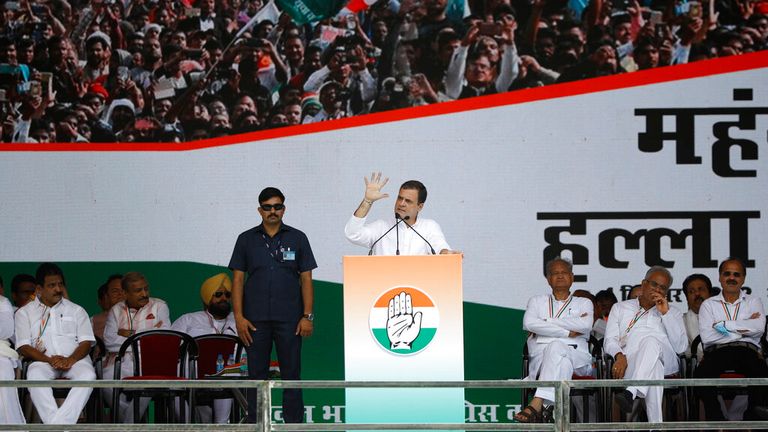Protests in India over rising food and fuel bills, as unemployment soars
Thousands of people gathered at a rally to protest against rising unemployment and a surge in food and fuel prices in India.

Thousands of people gathered at a rally to protest against rising unemployment and a surge in food and fuel prices in India.
Demonstrators rallied under key opposition Congress party leader Rahul Gandhi, who has accused Prime Minister Narendra Modi of prioritising polices which benefit big business groups over smaller industries and poorer individuals.
Mr Gandhi suggested the price of petrol, diesel, cooking gas and essential food items including wheat have rocketed between 45% and 175% since Mr Modi took control eight years ago in 2014.
The politician – whose father, Rajiv, was a former prime minister of India – addressed crowds at a rally in Ramlila Maidan, traditionally used to hold religious festivals and events, in capital New Delhi on Sunday.
He told his 21.4million Twitter followers: “Congress party unites the country. Only Congress can bring the country on the path of progress.
“We will go straight to the public and tell them the truth, whatever is in their heart, they will understand.”
Earlier, he had tweeted: “Today, people have to think ten times before buying what they need.
“Only the Prime Minister is responsible for these problems.
“We will keep adding voices against inflation, the king will have to listen.”
The Congress party tweeted ahead of the protest that Ramlila Maidan was “ready”, adding the country is “united against inflation and against inflation.”
Delhi Police said party workers protesting elsewhere were “taken in buses and dropped at the designated place of protest”.
No one had been detained, they added.
The government has defended itself by saying it had provided millions with housing, drinking water, free health insurance, toilets, gas connections and bank accounts.
Mr Gandhi also pointed the finger at the prime minister for creating “an atmosphere of fear and hatred” between Muslims and Hindus.
Mr Modi has long been accused of promoting a Hindu nationalist agenda, leading to tensions boiling over across the country.
In April this year, violence between Hindus and Muslims during a religious festival led police to impose a curfew in one town and ban more than gatherings of more than four people in parts of Gujarat, Mr Modi’s home state.
A day earlier, one person died and 10 people, including nine police, were hurt after a Hindu procession was pelted with stones in the region, in western India.
Gujarat was gripped by deadly violence in 2002, when Mr Modi was the chief minister and a rising star in the Bharatiya Janata Party (BJP).
Around 2,000 people, mostly believed to be Muslims, died in the month-long clashes.
A Muslim woman was gang-raped while five months pregnant during the rioting by a Hindu mob – which also killed her three-year-old daughter and 13 other family members.
Bilkis Bano, then 19, appealed to officials to rescind the decision to free 11 men jailed in 2008 for the horrific crimes, after it was announced they would be released in August.
The announcement sparked huge protests in New Delhi.



